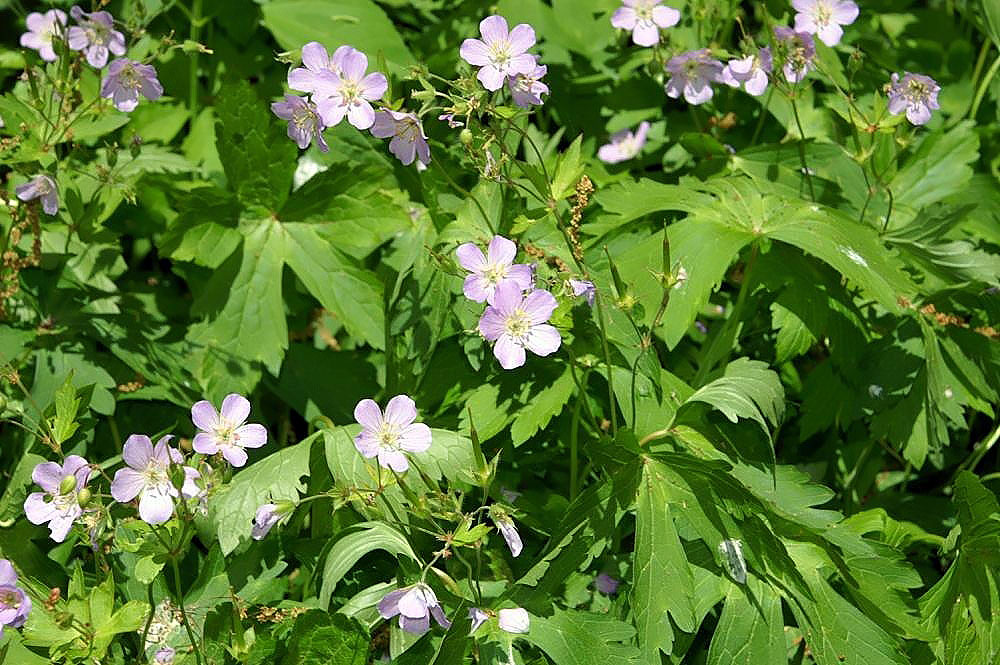Which native groundcovers are good for wildlife and pollinators?
Home gardeners are increasingly taking an interest in planting native ground covers. In many cases, people are looking to reduce the size of their lawn in favor of low-growing perennials that provide benefits to wildlife. Others are simply looking to fill their perennial borders with plantings that require few inputs and little labor. Whatever your reasons, many native plants make great groundcovers.
Large-leaved aster (Eurybia macrophylla) is one of the first asters to bloom in New Hampshire forests and woodlands. It grows well in moist, well-drained soils, but will tolerate sandy conditions in the shade. Blooming potential is highest when it is planted in partial shade. Large-leaved aster is often planted specifically for the effect of its foliage. It has big basal leaves and spreads by rhizomes or seed to form colonies. The pale violet flowers bloom from early to mid-fall, and are attractive to native bees and butterflies.
.jpg)
Bearberry (Arctostaphylos uva-ursi) is a creeping woody perennial that prefers well-drained sandy soils in full sun. Although slow-growing, bearberry has the potential to spread up to 3-6 feet or more. In NH, it is typically found on rocky slopes or exposed sites with dry, rocky soil. Drooping urn-shaped flowers are often pollinated by bumblebees and give-way to round, red, berry-like fruit in late summer. Birds, small mammals, and even bears love the fruits, especially in the winter.
Wild geranium (Geranium maculatum) is a popular groundcover for shady sites with moist, acidic soil. Its pale pink flowers bloom in early spring and provide good forage for butterflies, bumblebees, and other pollinators. It can be grown in full sun or partial shade, although the foliage may yellow in direct sun if the soil is allowed to dry out.

Common strawberry (Fragaria virginiana) is highly adaptable and grows well in a variety of situations. It spreads fastest when it is planted in full sun and rich, sandy soils. White flowers in spring turn into small, flavorful strawberries that are edible for both people and small mammals. The plants themselves propagate from stolons and can form large patches over time.
.jpg)
Lowbush blueberry (Vaccinium angustifolium) is well-loved by a wide variety of species. Birds and mammals (including people) enjoy the fruit, and pollinators frequent the flowers in the spring. Lowbush blueberries grow well in acidic, well-drained soils in full sun to part shade. It has become so popular as a groundcover that it can be purchased as sod. An added bonus is the brilliant red fall foliage.
.jpg)
Although native groundcovers are generally low maintenance plants, they still require some care, especially until they become established in the landscape. Until a new groundcover fills in, it can be assumed that weeds will make their way into the garden. Occasional weeding may be necessary for at least a season or two until the plants form dense enough colonies to block light from reaching the soil.
It is also important to note the ways that a groundcover spreads. Be wary of plants that propagate by suckers, stolons, or rhizomes, especially if you intend to keep the groundcover within a defined border. Even native groundcovers can quickly spread beyond the area where they were initially planted, creeping into neighboring beds, lawns, or woodland areas. Ask UNH Extension for specific groundcover recommendations for your own property.
Got questions? The Ask UNH Extension Infoline offers practical help finding answers for your home, yard, and garden questions. Call toll free at 1-877-398-4769, Monday to Friday, 9 a.m. to 2 p.m., or e-mail us at answers@unh.edu.
Related Resource(s)
Do you love learning about stuff like this?
SUBSCRIBE TO Granite State Gardening newsletter
Got questions? The UNH Extension Yard and Garden Infoline offers practical help finding answers for your yard and garden questions.
Call toll free at 1-877-398-4769, Monday to Friday, 9 a.m. to 2 p.m., or fill out webform.
